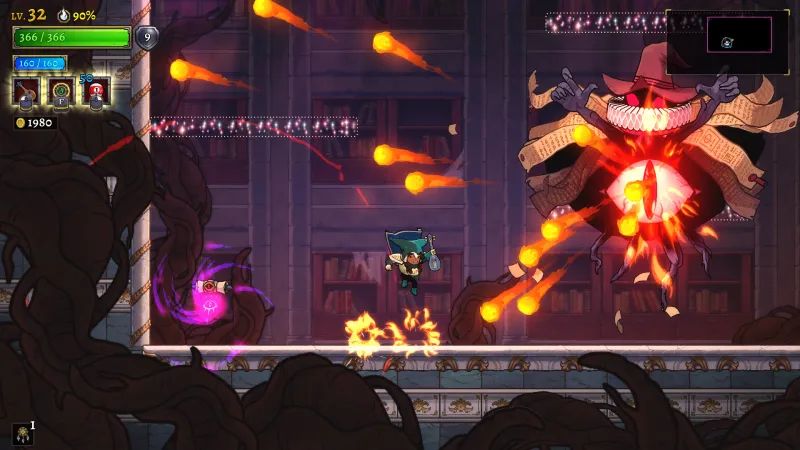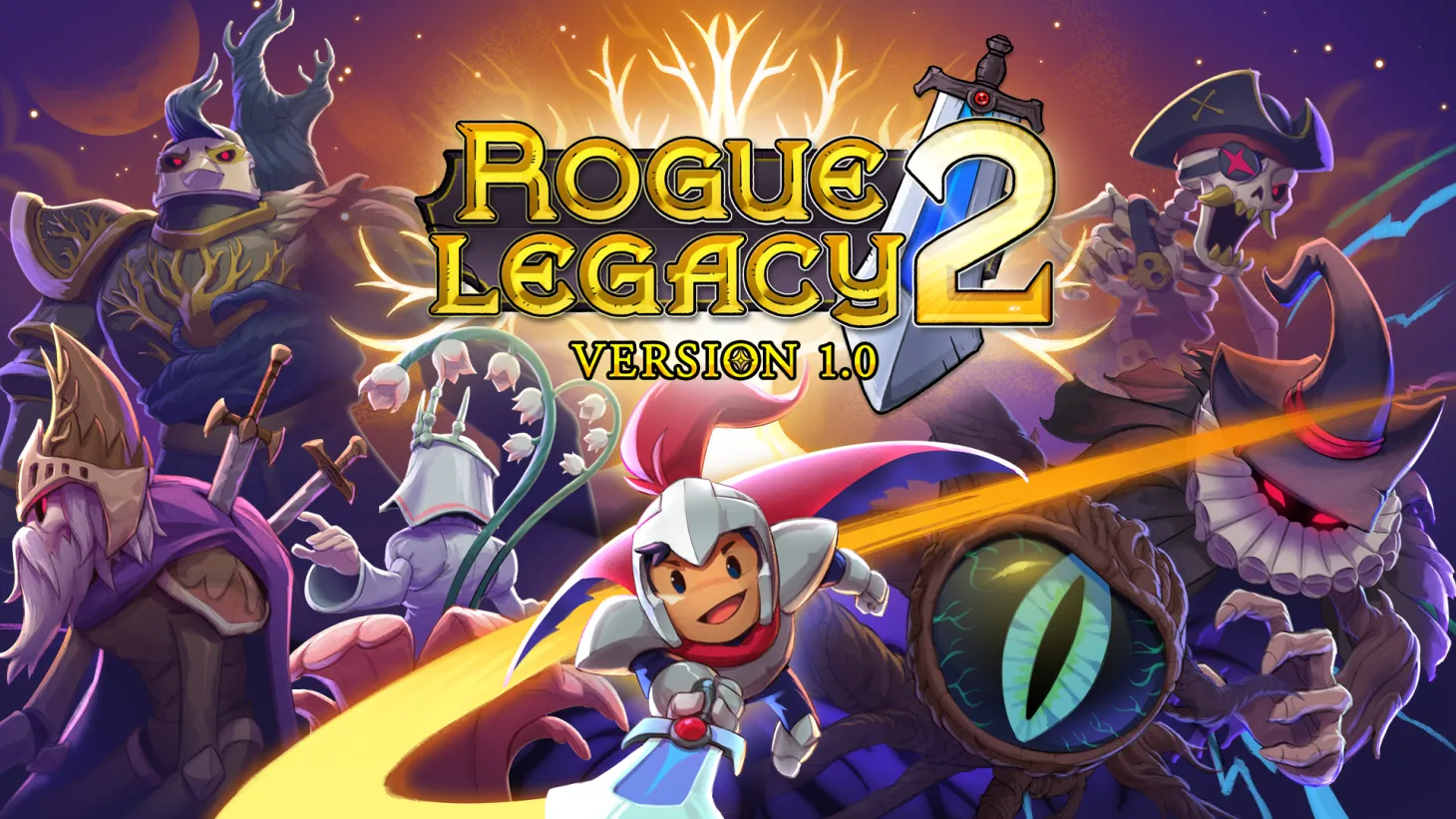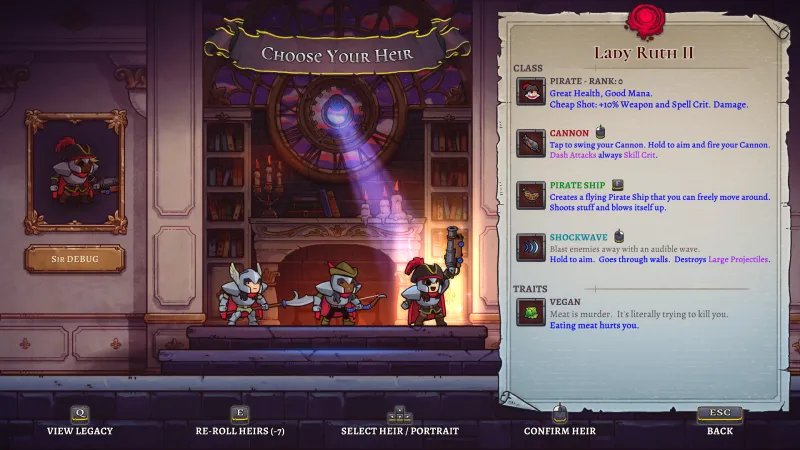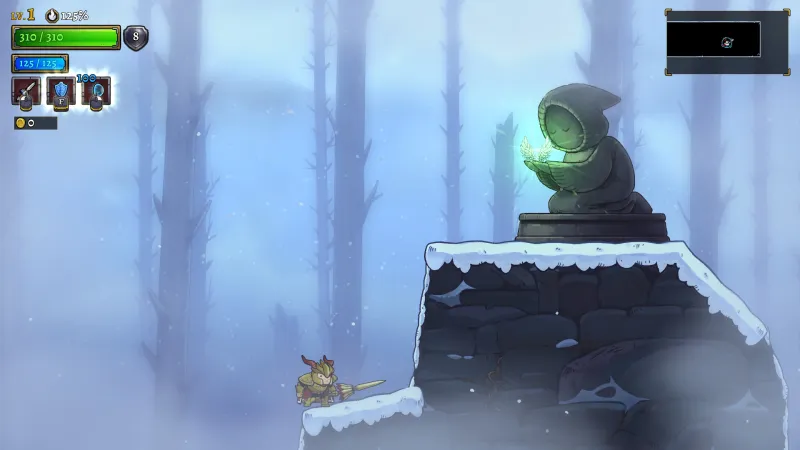


After nearly two years of being playable through early access, Cellar Door Games has fully released Rogue Legacy 2. I've been grinding away at finishing the rogue-lite sequel but haven't bested its toughest challenges yet, and I don't feel comfortable bestowing an official score on it until I do. However, I have poured well over 30 hours into Rogue Legacy 2 and have some thoughts to share about it in the meantime.
Once again, you control a bloodline destined to adventure into a procedurally generated castle to slay the bosses within. Every time an heir dies, you're given the choice of three (or more) new adventurers from the next generation equipped with inherited genetic traits that make every heir unique. These traits could buff attack damage at the cost of a reduced mana pool or maybe give an heir irritable bowel syndrome, which causes that heir to pass gas regularly when jumping or dashing. Sometimes gigantism runs in the family, making an heir's stature quite a bit larger than the average character. Traits can drastically change playstyles, while others might be humorous distractions designed to bring a smile to your face.

Rogue Legacy 2's core loop is a lot of fun, just like its predecessor. There were many times I felt Rogue Legacy 2 was sticking too close to the contents of the original, only to realize many of those aspects I thought were direct rehashes are actually new or significantly expanded. For example, while present in Rogue Legacy, classes are entirely different now and add significant changes in gameplay that I especially enjoy. An heir's class now determines which weapon and skills they are equipped with, giving every class a playstyle and identity.
The most basic class, the Knight, comes with the classic Rogue Legacy sword in hand and has a shield that can deflect attacks in a pinch. On the other hand, the Ronin uses a katana that can be aimed in diagonal directions and uses an ability to slash and teleport the character in whichever direction you aim. Those are straightforward compared to the Bard, who creates music notes that can be detonated by spin kicking them, or the Boxer, who can gain combo points, increasing damage with each hit and unleashing a deadly finishing blow. Exploring every class, of which there are many, drives a lot of the fun on every run. I love finding new synergies between weapons and traits that I didn't consider hours before.
Between runs, you'll be taking the gold you've earned from your prior generation and investing it into building a castle, which doubles as a skill tree to make each family member more capable. Here, you can increase stats like health, armor, mana, critical hit chance, and unlock new classes for future generations to inherit. While building the castle and buffing your characters is the main progression system for the game, it's easily the biggest problem I have with Rogue Legacy 2.

The number of skills to unlock and invest in was manageable at first but quickly grew out of control as I unlocked more. Many options become repetitive, such as having three or more health-increasing options that all give the same HP boost, making so much of it feel unnecessarily padded. Yes, you are improving your chances at a successful run with every upgrade, but the benefits gained become painfully minimal when the gold costs become far too expensive in the late game, where an hour-long run can sometimes net one or two minor increases to armor or dexterity. It should be empowering and fulfilling to upgrade the castle after a long, lucrative life, but that has rarely been the case in my experience.
Expect a challenge if you dive into Rogue Legacy 2. I've had many a run end far too soon by a brutal room of enemies getting the best of me and have thrown generation after generation of my heirs at the six big Estuary bosses. So far, the bosses are difficult but fair and can be taken down with careful planning and talented platforming. However, for those who may want to tweak the challenge separate from the skill tree, Cellar Door Games has implemented a menu it calls "House Rules," which lets you change all kinds of settings to make the experience more enjoyable and accessible. I appreciate any time a developer introduces ways to make granular changes in different aspects of a game so more people can see it through to the end in their own way, so kudos to the Rogue Legacy 2 devs for taking to time to make it happen here.

Despite my gripes with the upgrade system, I've been having fun with Cellar Door's new game and have been consistently surprised by synergies and new room layouts I'm discovering as I near the end of my playthrough. If you like or love Rogue Legacy, and have been holding out until early access ended, wait no longer. Rogue Legacy 2 is a bigger and better version of the original's formula and has kept me playing for "one more run" more times than I'd care to admit. Be sure to check back soon for my full review in the next week or two.